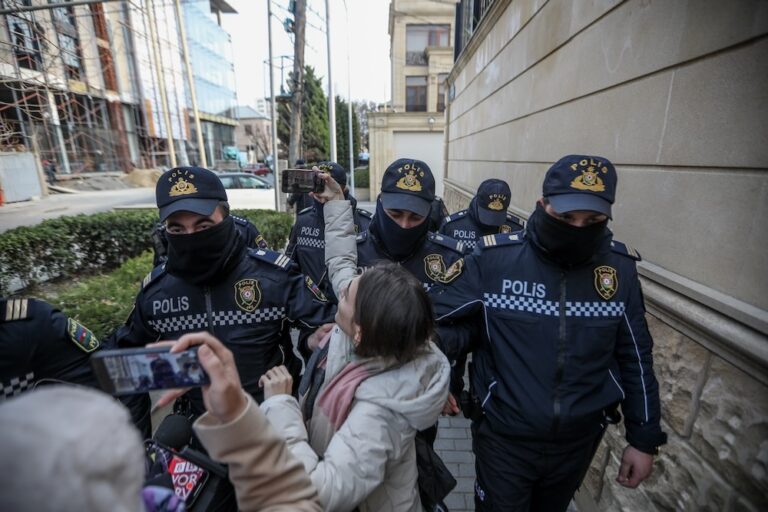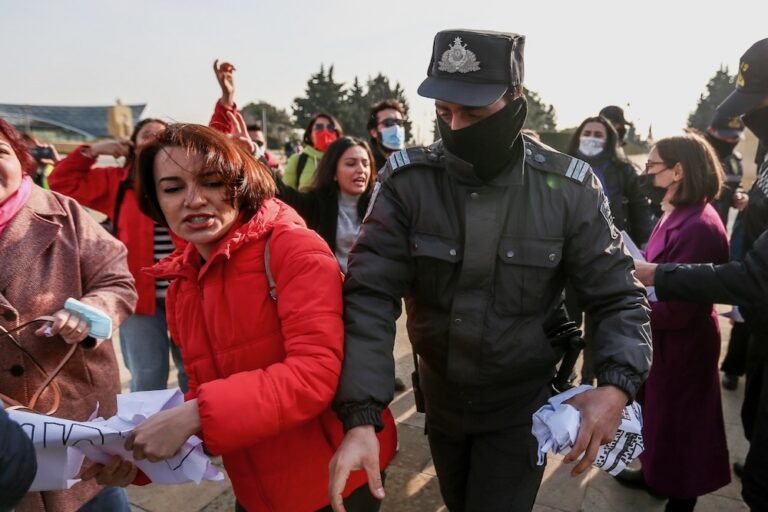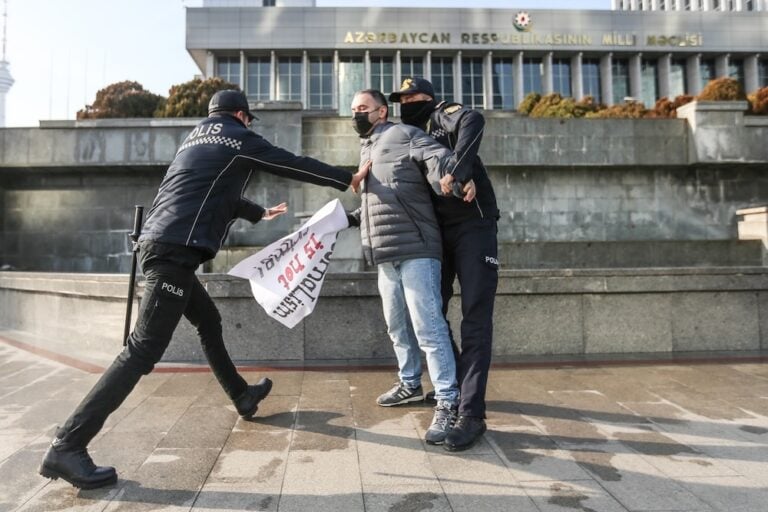(RSF/IFEX) – The following is an RSF press release: Press freedom curtailed since Ilham Aliev’s election as president Most of the testimonies gathered by Reporters Without Borders during a fact-finding mission to Baku on 1-2 December point to a curtailment of press freedom since Ilham Aliev took over as president from his father, Heydar Aliev, […]
(RSF/IFEX) – The following is an RSF press release:
Press freedom curtailed since Ilham Aliev’s election as president
Most of the testimonies gathered by Reporters Without Borders during a fact-finding mission to Baku on 1-2 December point to a curtailment of press freedom since Ilham Aliev took over as president from his father, Heydar Aliev, Azerbaijan’s ruler since 1993. Ilham Aliev was installed on 31 October following elections on 15 October that were a “step backwards for democracy” and fell far short of international standards, according to the European organisations that monitored them.
The elections and their aftermath exposed the lack of diversity in the broadcast media, the many kinds of pressure applied by the authorities on the opposition and independent print media and Azerbaijan’s failure to respect its international commitments on press freedom. Reporters Without Borders is particularly concerned about the detention of Rauf Arifoglu, the editor of the opposition daily Yeni Musavat, and the violence used against dozens of journalists while they were covering the protests on 15 and 16 October in Baku.
Reporters Without Borders calls on Ilham Aliev to change direction in his government’s policies toward the news media and to carry out reforms that would facilitate the development of a free and independent press.
The fact-finding mission interviewed representatives of the pro-government and opposition press, journalists’ associations and diplomats. It was able to visit Arifoglu in Bailov prison in Baku, where he has been held since 27 October. It also met the presidential aide responsible for the news media, Ali Hasanov, interior minister Ramil Ussubov and deputy attorney general Ramiz Rzayev.
Journalists caught up in electoral turmoil
Several thousand persons, mostly opposition activists, gathered outside the headquarters of the opposition party Musavat in Baku on the evening of 15 October to protest against fraud in the elections held that day. Violent clashes broke out between protesters and police. The clashes continued in Azadliq Square in Baku the next day, with a toll of one dead and more than 100 wounded. Around 600 persons were arrested and 107 of them are still being held, awaiting prosecution. According to the figures compiled by the Azerbaijan Committee to Protect Journalists, RUH, 54 journalists were the victims of violence and 16 were detained over the course of the two days. Most of the detained journalists were released on 22 October after being sentenced to several days in prison for “disturbing the peace”.
Some journalists undoubtedly took part in the protests as activists. But those who were there covering the events said the police, including plainclothes police, beat them all the same, even when they knew they were there as reporters from the press cards they displayed or because they told the police as much. Emin Husseynov, a journalist with the independent news agency TURAN who was hospitalised for several days with head injuries, said he was attacked by police on 16 October while with a group who were clearly identifiable as journalists. “I don’t belong to any party. We were just doing our jobs,” he told Reporters Without Borders. Nabi Alishev, of the daily Khurriyet, said he was carrying a tape recorder and a press card and told police he was a journalist, but they nonetheless hit him and dragged him along the ground on 16 October in Azadliq Square.
The list compiled by the RUH was sent to the interior ministry, which opened an enquiry to assess whether the police were responsible for abuses against journalists on 15 and 16 October. The Press Council, a body that has the job of dealing with conflicts involving the news media, is carrying out an independent, parallel investigation in cooperation with the attorney general’s office and the interior ministry.
The officials Reporters Without Borders met with were reluctant to recognise that there could have been abuses by the police. The presidential aide responsible for the news media, the interior minister and the deputy attorney general said it was impossible to distinguish journalists from demonstrators, while those carrying out the enquiries have not yet issued their findings.
The RSF fact-finding mission’s full report is available at: http://www.rsf.org.


